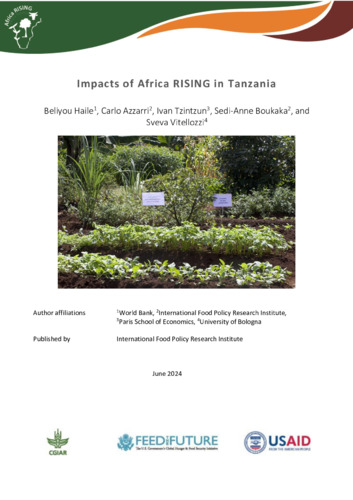Impacts of Africa RISING in Tanzania
Sustainable intensification (SI) of the smallholder sector in Africa south of the Sahara is among the approaches pursued to build resilient food systems that can supply nutritionally adequate food in the face of rapid population growth and climatic changes. This study assesses the impact of an SI program in Tanzania implemented in the poorest and most food insecure areas of the country since 2012. The program first validated and then scaled up a wide range of SI interventions focused on improved agronomic management and crop cultivars; improved livestock feed, housing conditions, and species; crop-livestock integration; integrated natural resource management; vegetable production and nutritional education; and small-scale mechanization. Impact is estimated on several SI indicators and domains using two rounds of quasi-experimental panel data (conducted in 2014 and 2022), propensity score matching, and difference-in-differences techniques. The study design allows us to estimate the impact of Africa RISING by comparing outcomes among program beneficiaries with two different counterfactual groups—one located inside program villages (within-village comparison) and another in non-program (control) villages (out-of-village comparison)—on several indicators across five SI domains environment, productivity, economic, human, and social. We also conduct a placebo test comparing non-beneficiaries in the two counterfactual groups. Results from panel data analyses show improvements in several indicators in the environmental and productivity domains. We also find positive impact of participation in Africa RISING on several indicators under all the considered domains: beneficiaries were less likely to experience soil erosion, used more inputs (fertilizers, pesticides, and seeds) per hectare, obtained higher legume yields, were more likely to produce meat and dairy, reported higher net livestock income, and experienced fewer months of food insecurity. Estimates based on within-village, out-of-village, overall, and placebo comparisons suggest important insights about the challenges in assessing the impact of agricultural programs in general and, specifically, participatory multi-intervention programs in the presence of sample (self-)selection and spillovers. Our study highlights useful empirical lessons learned for informing future program design and impact assessments.
Authors
Haile, Beliyou; Azzarri, Carlo; Tzintzun, Ivan; Boukaka, Sedi Anne; Vitellozzi, Sveva
Citation
Haile, Beliyou; Azzarri, Carlo; Boukaka, Sedi-Anne; Tzintzun, Ivan; and Vitellozzi, Sveva. 2024. Impacts of Africa RISING in Tanzania. Washington, DC: International Food Policy Research Institute. https://hdl.handle.net/10568/148751
Keywords
Tanzania; Africa; Sub-saharan Africa; Eastern Africa; Impact Assessment; Sustainable Intensification; Smallholders; Resilience; Food Systems; Climatic Change
Project
Policies, Institutions, and Markets









